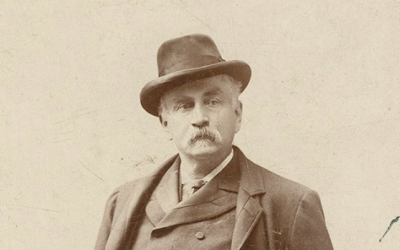In late October 1877 young Rolf Johnson and three friends left their homes in Phelps County, Nebraska, for a buffalo hunt in northeastern Colorado. The hunt was not very successful. By mid-November the four were back in the Nebraska settlements where they had one last adventure. Johnson kept a diary, quoted here. It was recently published as Happy as a Big Sunflower: Adventures in the West, 1876-1880, by the University of Nebraska Press. The original is at the Phelps County Historical Society.
“Our ‘outfit’ consisted of two wagons drawn by three yoke of oxen and loaded with blankets and buffalo robes for bedding and provisions, such as flour, bacon, coffee, sugar, salt butter &c. Clarence had a Sharps Sporting rifle calibre ’44,’ cartridge belt, and butcher knife; Burgquist was armed with a Springfield needle gun, cal. 50. Pete Peterson had no arms at all; while I had a 10 shot repeating Henry rifle (which I had borrowed).
“Nov. 3. This morning we moved our camp about a mile and a half further west on a big bottom, near a small shallow pond of water, or rather mud puddle. The water was strongly impregnated with alkali and very disagreeable to the taste, . . .
“Nov. 4. Snow is lying about, the wind is keen and cutting, and so we cower around the camp-fire, continually shifting around to keep from freezing one side and scorching the other. I begin to realize that buffalo hunting and camping out in the winter is not what it has been ‘cracked up’ to be.
“Nov. 9. After dinner I went out hunting and about sunset I came on a herd of about 40 or 50 buffalo in the hills about two miles from camp. After much crawling through the sand and sage brush I came within twenty-five yards of a fine bull, which was grazing apart from the others on a hillside while I lay on the top of the hill behind a clump of sage brush and long grass. He had his broadside to me and taking steady aim at the place where his heart ought to be, I pulled the trigger. The huge beast gave a hoarse bellow. Unfortunately my rifle was ‘out of whack’ and I had some difficulty in ejecting the cartridge shell. When I finally got it in working order I commenced to fire promiscuously into the herd, which broke panic stricken. . . . I was fearful the fleeing herd would pass through camp and stampede our cattle, so I struck a bee line for camp. On getting there I found my worst fears realized. The cattle had pulled their lariat stakes and skipped.” Johnson found the cattle the next day “walking around the camp dragging their picket ropes.”



